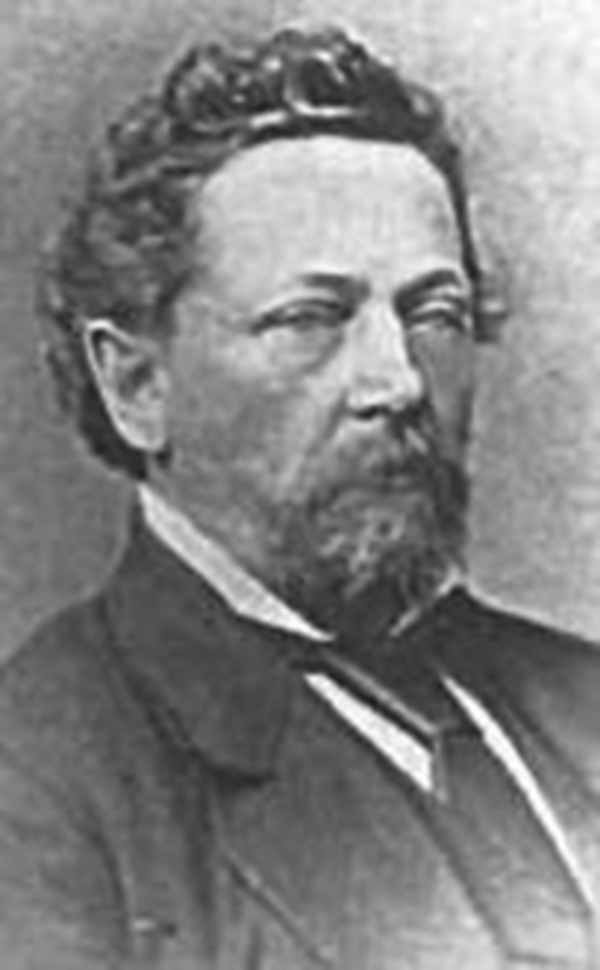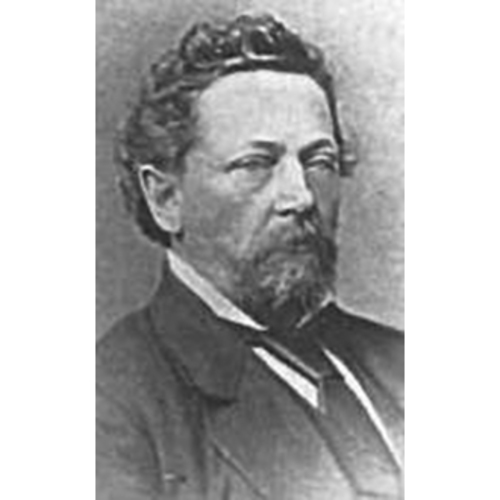
Source: Link
BARNARD, FRANCIS JONES, businessman and politician; b. 18 Feb. 1829 at Quebec City, Lower Canada, son of Isaac Jones Barnard, harness maker, and Catherine Telfer; m. 6 July 1853 Ellen Stillman, and they had two sons, Sir Frank Stillman* and George Henry*, and a daughter, Alice, who married John Andrew Mara; d. 10 July 1889 at Victoria, B.C.
Francis Jones Barnard, who came from a loyalist background, attended school in Quebec City until the age of 12 when he went to work to support his recently widowed mother. In 1855 he moved from Quebec City to Toronto, but three years later Barnard set out for the Fraser River gold-fields, travelling via New York and Panama. He reached Fort Yale (Yale, B.C.) in 1859. There he mined for gold without success, sold his claim, found work splitting cordwood, and then became a constable. In 1860 he was purser on the Fraser River steamer, Fort Yale; on 14 April 1861 the engines blew up near Hope. He then helped to build the trail from Yale to Boston Bar, and on its completion obtained a contract to clear and grade Douglas Street in Yale. Barnard and his family made their home in this town from 1861 until 1868.
In December 1861 Barnard acquired the business of Jeffray and Company, which carried the official mail from Victoria to Yale without charge; that winter he took the mail on foot from Yale to New Westminster and back, a distance of 200 miles. The next spring, charging two dollars a letter, he carried mail between Yale and the Cariboo, a round trip of 760 miles. In May 1862 Governor James Douglas* called for tenders for delivering the official mail from Yale to Williams Creek in the Cariboo. Barnard and his partner Robert Thompson Smith organized the British Columbia and Victoria Express Company, submitted a bid of £1,555 for one year, and on 25 June were awarded the contract for monthly delivery during the winter and bi-weekly at other times. On 1 July the establishment of regular service was announced, and on 7 July Barnard started out from Victoria with her majesty’s mail.
During his first year Barnard had only a pony which he led on foot from Yale to Williams Creek. In 1863 he acquired two-horse wagons to use between Lillooet and Alexandria and entered into an arrangement with George Dietz and Hugh Nelson* to convey the government mail from Victoria and New Westminster to Yale, the start of the Cariboo Road, and to Douglas, the start of the Harrison-Lillooet Road. Commencing on 1 May 1864 Barnard’s Cariboo Express left both Yale and Douglas every ten days, converged at Williams Lake, and then ran to Soda Creek; from there the mail was shipped by river steamer and saddle-train to Williams Creek. On 22 June, in conjunction with Dietz and Nelson, he obtained the government contract of £5,000 a year to make three deliveries of mail a month to Barkerville. In December he received another £2,000 for providing weekly service.
In addition to his mail and express business Barnard had established a stage-coach line earlier that year, using four-horse thorough-brace Concord stagecoaches from California. These vehicles proved so popular with the passengers transported by Dietz and Nelson from Victoria and New Westminster to Yale and Douglas that Barnard purchased larger, 14-passenger, 6-horse Concord coaches. By employing “crack whips” and having relays of fresh horses every 13 miles along the Cariboo Road, he was able to travel the 240 miles from Yale to Soda Creek in 48 hours. During the 1864 mining season Barnard’s stagecoaches travelled some 110,000 miles, carried all the mail to the interior, transported 1,500 passengers to and from Soda Creek at the one-way fare of $130, and conveyed $4,619,000 worth of gold from the Cariboo to Yale. He employed 38 men, owned 400 horses, and had a way-station and stock ranch at 134 Mile House. When the full length of the Cariboo Road was completed to Barkerville in 1865, he had more property and way-stations, and in 1870 he acquired still more land in Lillooet and Lytton.
Late in 1865 the mining boom faltered, passengers grew fewer, and the volume of express freight declined, but by that time Barnard had established a monopoly over gold-carrying after the government in 1864 suspended its armed gold escort. Confident of Barnard’s reliability and honesty, bankers and miners entrusted conveyance to him, sometimes in amounts of $10,000 and $20,000. He reduced his service to Williams Creek to once a week in 1866. There was a boom on the Big Bend of the Columbia River that year, but it, and Barnard’s Kootenay express service, were short-lived.
In 1867, with a contract to deliver mail throughout the colony from January 1868 to October 1870 for $16,000 annually, he absorbed the express company of Dietz and Nelson and controlled all business between Victoria and Barkerville. He began to dream of a transcontinental transportation enterprise and in December wrote a friend that he planned to bring mustangs from California to breed stock in British Columbia “preparatory to running a coach from Yale to Lake Superior. Don’t put me down for crazy.” He sent his driver Stephen Tingley to purchase the horses. Near the northern end of Okanagan Lake he founded the B X Ranch, which his son Frank expanded in the 1880s until it had 2,000 head on 7,000 acres.
In 1867 he had been elected to the Legislative Council of British Columbia. In September of the following year, as the delegate from Williams Lake, he played a prominent part in the Yale Convention, which passed resolutions favouring immediate union with Canada. Later he urged the Legislative Council to include, as a term of union with Canada, the demand for a wagon road from Upper Fort Garry (Winnipeg) to British Columbia. When in 1870 the Canadian government promised instead a railway to the Pacific, Barnard realistically decided not to compete with the railway but to confine his business to the Pacific slope.
In 1870 Barnard resigned from the Legislative Council to avoid a charge of conflict of interest and organized the British Columbia General Transportation Company with Josiah Crosby Beedy. In October, after he was unsuccessful in a request for a $32,000 government subsidy to import from Scotland specially constructed steam carriages for the Cariboo Road, he lost the mail contract, but two years later the federal government awarded him the provincial mail contract and the traffic on the road increased as surveying for the railway began. In 1874 Barnard himself won the federal contract to build the 700-mile section of the Canadian Pacific Railway telegraph line from Fort Edmonton (Alta) to Cache Creek (B.C.) passing through the Yellowhead Pass. He invested so much of his money in this project that it became necessary to reduce his financial interest in his express company. In 1872 two of his drivers, Tingley and James Hamilton, had been made partners in F. J. Barnard and Company, and six years later, when the British Columbia Express Company was incorporated with a capital of $200,000, it included as additional partners Barnard’s son, Frank, and his brother-in-law, George Andrew Sargison. Frank became the general manager in 1880 and the president in 1883.
Barnard suffered a grave financial reverse when the government of Sir John A. Macdonald* abandoned the Yellowhead Pass railway route and in 1879 cancelled his contract for the telegraph line. He brought suit against the crown for $225,000 in damages. His success in the federal by-election in Yale in July 1879 did not go unnoticed in the east. The Toronto Globe charged that his only interest was in a financial settlement, and that his claim was of “the most fraudulent character.” During the inquiry into his claim, held in British Columbia early in 1880, George Anthony Walkem*, the premier and attorney general of the province, acted as counsel for the federal government against Barnard. Later, when his own political quarrel with the dominion was at its height, Premier Walkem conducted Barnard’s case against the crown but failed to get compensation.
Worry over the matter affected Barnard’s health and in 1880 he suffered a severe stroke. He was re-elected to the House of Commons in 1882 but was soon an invalid, and did not run in 1887. The following year he declined a seat in the Senate. On 10 July 1889 he died at Duval Cottage, his home in Victoria after 1868, leaving an estate of less than $30,000.
During the gold-rush period Barnard had successfully eliminated on mainland British Columbia the competition of the small American transport companies as well as the powerful Wells, Fargo and Company, and had established a virtual Canadian monopoly in the essential carriage of mail, express freight, passengers, and gold. His famous “B X” Company, which in 1874 delivered mail through Wrangel, Alaska, to the Cassiar mines (B.C.), was said to be the longest stage line in North America; it certainly was unrivalled for efficiency and dependability. Tingley took over the company in 1886 and it lasted, under various owners, until 1913 when automobiles replaced coaches on the upper Cariboo Road. An entrepreneur who envisioned further Canadian participation in the economic development of the Pacific seaboard, Barnard was one of the prime movers in obtaining British Columbia’s union with Canada.
Francis Jones Barnard was the author of To the electors of the district of Yale . . . (n.p., 1879?).
PABC, Add. mss 527; 696; B.C., Colonial secretary, Corr. outward, September 1861–November 1862; O’Reilly coll., Dewdney corr., F. J. Barnard to Edgar Dewdney, 18 March 1883; G. A. Sargison, Diaries, 1871–72. Private arch., A. B. Robertson (Vancouver), F. H. Barnard, “Canada’s first stage coach; Frank Stillman Barnard, businessman and pioneer; Senator G. H. Barnard, the younger son” (typescript). B.C., Statutes, 1878, c.2. British Columbian (New Westminster, B.C.), 14 Dec. 1864. Daily Colonist (Victoria), 11 July 1889. Government Gazette-British Columbia (New Westminster), 10 Sept. 1864. CPC, 1880. J. B. Kerr, Biographical dictionary of well-known British Columbians, with a historical sketch (Vancouver, 1890), 91–94. A. S. Deaville, The colonial postal systems and postage stamps of Vancouver Island and British Columbia, 1849–1871 . . . (Victoria, 1928). G. R. Elliott, Quesnel: commercial centre of the Cariboo gold rush (Quesnel, B.C., 1958). H. C. Hitt and G. E. Wellburn, “Barnard’s Cariboo express in the colony of British Columbia, 1860–1871, and later expresses of F. J. Barnard,” The stamp specialist black book (New York, 1945), 3–32. E. O. S. Scholefield and F. W. Howay, British Columbia from the earliest times to the present (4v., Vancouver, 1914), II, III. “Francis Barnard: from his broad back grew a mighty industry,” Province (Vancouver), 19 July 1958: 15. W. J. West, “Staging and stage hold-ups in the Cariboo,” BCNQ, 12 (1948): 185–209.
Cite This Article
Margaret A. Ormsby, “BARNARD, FRANCIS JONES,” in Dictionary of Canadian Biography, vol. 11, University of Toronto/Université Laval, 2003–, accessed February 27, 2026, https://www.biographi.ca/en/bio/barnard_francis_jones_11E.html.
The citation above shows the format for footnotes and endnotes according to the Chicago manual of style (16th edition). Information to be used in other citation formats:
| Permalink: | https://www.biographi.ca/en/bio/barnard_francis_jones_11E.html |
| Author of Article: | Margaret A. Ormsby |
| Title of Article: | BARNARD, FRANCIS JONES |
| Publication Name: | Dictionary of Canadian Biography, vol. 11 |
| Publisher: | University of Toronto/Université Laval |
| Year of publication: | 1982 |
| Year of revision: | 1982 |
| Access Date: | February 27, 2026 |



